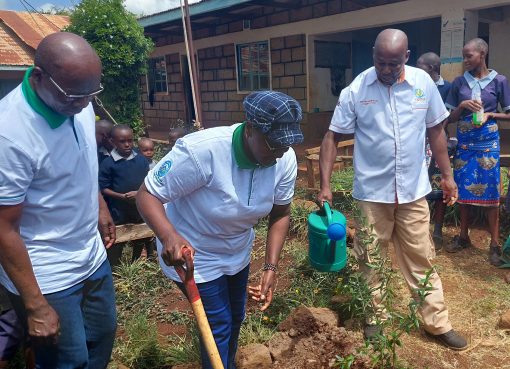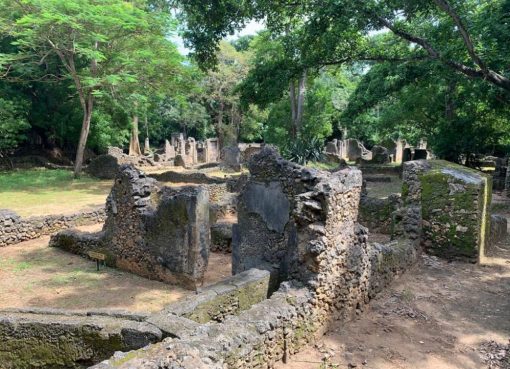The Kenya Meat Commission (KMC) has been commended for ensuring that the meat sector delivers quality meat to the Kenyan citizenry and the export market.
Speaking at the Meat Training Institute (MTI) during the graduation ceremony of 57 KMC employees, MTI Principal, Salome Kairu said the institution’s vision was to train personnel from meat trade and industry in hygienic production, inspection and processing of meat and meat products.
“I want to single out the contribution of the Kenya Meat Commission over the years in the training of meat handlers and meat processors in Kenya and beyond. The collaboration in this endeavour has been a strong one,” Dr Kairu said.
“The purpose of the graduation ceremony was to mark the successful completion of the Slaughter House Attendants’ Pilot Course by staff of the Kenya Meat Commission,” said Dr Kairu.
She said KMC, whose motto is “Cut above the best’ had offered the opportunity for the institution to use its facilities for practical training purposes without reservations.
Dr Kairu said the successful training of 57 KMC staff on the slaughterhouse attendants’ course was a testimony of the strong collaboration and the commitment of the KMC administration to support the vision of the livestock sector.
“There is strong evidence of support of the livestock sector by the Kenya Meat Commission in other areas too. These include absorption of a good number of graduates and former staff of the Meat Training Institute, both young and older in the jobs available at the KMC who we believe is instrumental in further, in-house training of slaughter personnel,” she said.
She said the slaughterhouse attendants’ course was appropriate for KMC staff as it had provided them with the skills to participate in slaughterhouse operations like slaughtering cattle, sheep and goats.
“This is an animal welfare issue that is regarded with utmost importance globally, hygiene practices in the slaughterhouse, a food safety issue, knowledge on the value of slaughtering food animals hygienically,” said Kairu.
“Knowledge on the value of hygienic transportation of meat and knowledge on the value of slaughterhouse by-products like blood, manure, horns, bones and their proper handling,” she said.
On his part, KMC Managing Commissioner, Brigadier James Githaiga said the commission had crafted a Memorandum of Understanding(MoU) with MTI based on Competence-Based Education and Training through targeted and scheduled training for development of KMC staff skills.
“Today graduands of the slaughter house attendant course stand out as the pilot course output of the KMC and MTI agreement,” Githaiga said during the graduation ceremony that was also attended by the graduands’ families.
He said the training was meant to impact necessary skills, which will create career growth, motivate staff and increase work efficiency, impact slaughtering skills of cattle and goats, build capacity for the trainees to effect hygienic processes and practices in the slaughterhouse.
“The training is also intended to enforce proper inspection, grading and processing of meat and meat products in line with KMC’s business mantra, ‘A Cut Above the Best!’, foster career growth, and contribute to reduction of the national meat post-harvest loss by proper hygienic handling,” said Githaiga.
He added that 14 percent of meat per animal was lost during slaughter time nationally.
“As we celebrate the fifty-seven (57) graduands, I want to thank you for balancing job performance, family and training at the same time. Congratulations and well done!,” Githaga said.
KMC was established on June 1, 1950 through an Act of Parliament, Cap 363 of the laws of Kenya. Ministerial responsibility of the KMC was transferred to the Ministry Of Defence from the Ministry of Agriculture Livestock and Fisheries through a directive by former President Uhuru Kenyatta dated September 7, 2020.
“To ensure full operationalisation, a turnaround strategy was laid down with requisite processes, policies and systems put in place. This included establishment of a robust KMC human resource policy/programmes and instruments through the guidance and expertise from the public service,” Githaiga said.
Githaiga said the activities were focused on organisation structure and staffing for KMC, human resource policies and procedures manual, career guidelines, staff remuneration, medical scheme, pension scheme, staff audit, placement of staff and training.
He said placement of staff brought about gaps in general processes hence the need for training to enhance career progression, efficiency and effectiveness in production where he thanked KMC’s Board of Commissioners for authorising the undertaking of the training.
“I thank the MTI management and fraternity for your commitment to offering the lessons out of your busy schedule and giving it at a discounted rate in terms of fees, I thank the KMC management and the families for supporting the staff during the entire training duration,” Githaga said.
He said KMC will collaborate with MTI in undertaking further upgrading and specialised courses for the graduands, and train other KMC staff and departments to ensure professionalism, effectiveness and efficiency in operations.
By Rachael Kilonzo





